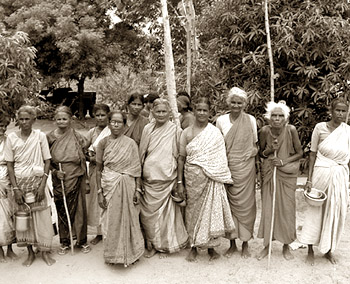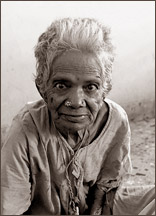Sri Lanka's socio-economic plight by 2025
Policy makers have neglected the rise in population
figures:
by Indeewara Thilakarathne
As Sri Lanka is experiencing a major demographic shift in the age
pyramid a proportion of the population over 60 years has dramatically
increased from 5.3 in 1953 to 10.8 per cent in 2003, making Sri Lanka
the fastest ageing population among the developing nations.
According to Prof. W. Indrala De Silva, Head of Department of
Demography University of Colombo, population aging is the
 proportion of
elderly in a given population. In developing countries, population aging
is counted from over 60 years whereas it is over 65 years in developed
countries. proportion of
elderly in a given population. In developing countries, population aging
is counted from over 60 years whereas it is over 65 years in developed
countries.
In 2001, proportion of the elderly (over 60 years) in the population
was only 9 per cent. Few decades ago, it was 6-7 per cent of the entire
population. However, the aging population, at present, is more or less
11 per cent.
"By the year 2025, one out of four persons will be elderly. Nearly 25
per cent of the population will be elderly. It is a very rapid process
in Sri Lanka. By 2001, Sri Lanka had only 2 million elderly people and
this will be doubled by 2021. Compared to SAARC countries, our process
of aging is very rapid.
Even in Thailand, doubling the aging population will take place in
22-25 years time. However, by the year 2001, Sri Lankan population was
18.7 million and it will never double." said Prof. Indrala de Silva.
According to Prof. Silva, Sri Lankan population will increase up to
22 million by year 2030 which will be the peak. Thereafter, it will
remain constant for some time and would even decline. As this occurs
against the backdrop of a rather slow economic growth, it will put added
strain on the economy.
One of the factors that has a great impact on the aging process was
the Government policy of reducing fertility which was introduced after
the 1950's with the assistance of international and local organisations
and the aging process was also expedited by the declining mortality
rate.
"Aging is a by product of these successes. At the beginning, some of
the scientist could not understand this and they were supporting family
planning and sterilisation programmes in a very vigorous manner. Because
there were payments and incentives, there were cases where even
unmarried couple got incentives.
Therefore, aging is a success of rapid fertility decline and rapid
mortality decline," observes Prof. Silva.
The principle factor for an aging population is the rapid decline in
the fertility rate. By 1950, one mother produced more or less six
children but today it is less than two children (1.7 children per
mother), well below the replacement level (2.1).
Sri Lankan birth rate is at 1.7 per cent. On the other hand the
mortality rate has declined, thereby increasing life expectancy which
was in the 1950's around 50 years and by 2001 it reached up to 76 years
for females and 69-70 years for males. Besides these two key factors,
international migration has also adversely affected the aging process.
 Currently 1.5 million Sri Lankans are working in the Middle East as
semi-permanent migrants. At a given moment, a significant number of
young people in the age group of 20-45 are out of the country which is
termed out as documented migration. Currently 1.5 million Sri Lankans are working in the Middle East as
semi-permanent migrants. At a given moment, a significant number of
young people in the age group of 20-45 are out of the country which is
termed out as documented migration.
However, significant number of undocumented migration also takes
place as males migrate to European destinations and even to India as a
result of the unstable political and military situation in the North and
East. According to Prof. Silva the aging population will be a serious
socio-economic issue within next 20 years.
Sri Lankan demographic situation
As most of the Sri Lankans are engaged in unproductive economic
activities such as wholesale and retail businesses the real production
process is not taking place within the economy.
"At present, Sri Lankans demographic environment is very attractive
for economic development. For 100 people in the working age, they have
to look after only 53 dependents which is the lowest dependency rate.
However, this favourable dependency rate will increase with the
population aging.
This favourable demographic environment will remain only for 5-6
years. It seems we are going to miss this demographic bonus, because of
the problematic condition in the country. Countries such as Korea, Hong
Kong and even China utilised this demographic bonus for their rapid
economic development.
Now, we are in the best demographic environment which we could
utilize for a rapid economic growth provided sound economic fundamentals
at place," said Prof. Silva referring to the demographic bonus.
Prof. Silva is of the opinion that the population figures have been
neglected by policy makers. Policy makers should understand the rapid
aging process in order to tackle issues emerging from it.
Economic restructuring is required so as to provide employment
opportunities for persons over 60 as they live 17-23 years after
retirement (male 17 years and females 23 years). Measurers such as
compulsory age of retirement could be extended up to 65.
Lack of social security schemes, primary care givers for elderly and
no proper income for elderly female who could not engage in gainful
economic activities due to lack of sufficient education, are some of the
issues emerging from population aging.
Socio-economic implications
According to Dr. Chandana Aluthge, senior lecturer in economics at
the University of Colombo the current income generated by an average
person is not sufficient even to cover day-to-day expenses hence
majority cannot save money for their retirement. So the aging will be a
major issue.
Economic policies have to be introduced in order to tackle the issues
emerging from aging, considering the sensitive socio-cultural factors.
Though paying homes for elders have been introduced in Sri Lanka,
they have not been, to a certain extent, socially acceptable. Most of
the inmates are those who have been admitted due to family problems and
not admitted as a part of a long term plan.
The economic implications of the aging population will extend to the
areas of social security schemes such as pension, ETF, EPF, to the
health sector where considerable expenditure will be incurred from
special drugs for elders and infrastructure to cater to their specific
requirements.
Against the rising inflation, the EPF, ETF or a lump sum received at
retirement is insufficient to cover day-to-day medical expenditure
alone. They also cannot depend on interest rates as interest rates are
low.
This situation would further exacerbate given the impact the
government pension schemes make on the Gross Domestic Production (GDP).
Expenditure on pension per GDP has risen from 2.4 per cent in 1994 to
4.2 per cent in 2002.
In the health sector, facilities to treat chronic illness such as
heart disease, kidney failures, cancer would have to be increased and it
is expected that sanatoriums for bed-ridden elders means the government
will have to expend a large amount of money on expensive drugs for
elders will have to be seriously reconsidered.
The age dependency ratio which indicates a number of persons depend
on the work force is also expected to rise further burdening on the
economy. According to Department of Census and Statistics, the aged
dependency ratio has increased from 9.4 per cent in 1946 to 15.4 per
cent in 2001 and expects to increase to 41 per cent in 2041. Six workers
support one aged in 2001 will rise to two workers supporting one aged by
2041.
This natural crisis in demographic transition would further deepen if
policy decisions are not taken in vital sectors of the economy such as
the health sector given the severe economic strain brought about by the
protracted war and growing number of Internally Displaced Persons and
dime prospects of short term recovery in the tourism sector.
[email protected]
|
